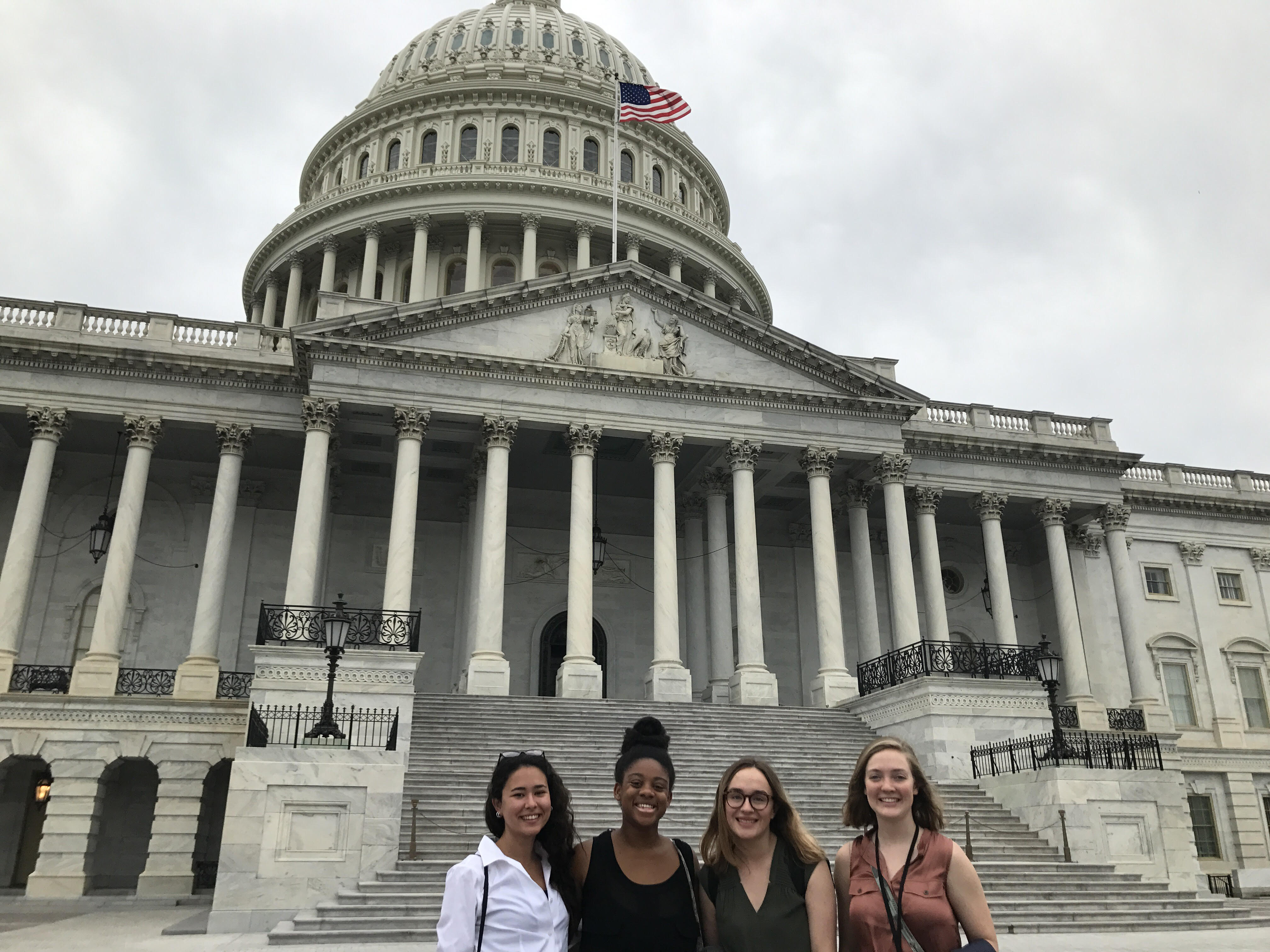I’m sure you’ve heard some iteration of this story a million times: hopeful activist comes to DC ready to make change and by the time they leave, they are a hopeless cynic with no faith in the American government. I arrived in DC and attended a Gender Equity and Environment Activist workshop at the Sierra Club, where youth activists from all over the country came to learn about gender equity and the environment from speakers as well as each other, and then lobby about these issues in congress. I too was hopeful and ready to make change. But, unlike the trope, I left the workshop with more optimism and faith in my peers, organizations and yes, even politicians, than I started with.

Sara with other training attendees at the U.S. capitol.
I attend a small, private, mostly STEM-focused college, and here, trying to get people to care about politics feels like pulling teeth. But being dropped into a pool, even briefly, of people who, not only care about politics, but are devoting their lives to making positive political change was an amazing experience. Gender and the environment is still a relatively obscure intersection, and yet these activists have written papers, led community projects, and started organizations surrounding the topic. Being passionate about a subject like this can be an uphill battle and getting a chance to be around others fighting the same battle was beyond inspiring.
Even though I came out feeling validated, the workshop was by no means an echo chamber. There were people from all different backgrounds and all different identities: mothers, students, women, men, LGBTQ, and so on. Every activist saw the subject differently and brought their own experiences to it, because in the end, this intersection is about people. In DC, it’s easy to get wrapped up in bureaucracy and statistics, but meeting these other activists added humanity to my work and reminded me that it is not to be done alone.
They say money talks, but I think in today’s political climate, money screams and throws temper tantrums. And sometimes, it really feels like all of that money is in the wrong hands. But, throughout the activist training we heard speakers who were part of companies and organizations that are helping place money in the right hands. We heard speakers from environmental organizations like the International Union for Conservation of Nature (IUCN), Defenders of Wildlife, and the Sierra Club. All of these organizations are not only doing their best to help the earth but also are trying to help the people through the expansion of equity and justice programs. This is a huge step forward from the environmental movement's flawed past.

Sara and other training atendees learning about climate change in Bangladesh from Monica Jahan Bose while making saris for Storytelling with Saris.
On the less traditional side, we heard a speaker from Solar Sister, a non-profit that helps women in rural Africa become entrepreneurs by selling solar lights. Oppression and poverty go hand and hand, but so does the dependence that often comes with traditional methods of helping those in need. This method gives these women a path to financial security in conjunction with autonomy and power they had previously lacked. This is just one example of the intersectional, multifaceted ways people are using money for good. You may not be able to fight fire with fire, but this activist training taught me you can fight a lot of bad money with a little bit of good money and a lot of passion.
Now, this one might be a tough sale, but lobbying really did make me more optimistic about our political system. We went in with two asks. One was to tell House Representatives to cosponsor a resolution that would recognize gender as a factor in environmental efforts, and the other ask was to tell our Congress members not to cut funding for the EPA. Going in, we had meetings we knew would be easy, where the Representative was a known Sierra Club ally. Giving our Representatives more reasons to care and more political ammunition through personal stories is incredibly important. I told my Representative stories about the EPA funded community center I grew up next to, and now my Representative can better understand what cuts to the EPA might actually mean to the communities he represents. Then we had some more moderate Democrats, which were some of my favorites. There are politicians who are paying attention and fighting back.
Finally, we had a meeting with my favorite congressman, Cory Gardner, the Republican Senator from Colorado who has a League of Conservation Voter Score of a measly 11%. Now, Senator Gardner talks big on conservation and the environment, but has a voting record that would appall even the most casual environmentalist. Before we met with him, we did thorough research, finding quotes from his website and directly cross checking them with his voter record. And, although it may not make any huge long term difference, there was nothing more satisfying than calling Gardner out and watching his environmental staffer stumble over himself trying to defend the Senator. It was a great reminder that I’m his boss, and in the end, all members of Congress, have to answer to their constituents. So go out there and make them answer to you.
I know doubt in our political system is at an all time high. I see it from my peers when they refuse to vote, or write in Noam Chomsky or Burnt Toast for president. I see it in activists in the form of empathy fatigue. And, believe me, after the 2016 election, I’ve been there. I’m so glad I’ve been able to find places like this activist workshop and the Sierra Club that have rekindled my passion and confidence in politics and my ability to change that which is unacceptable. I’m sure you’ve heard it a million times, but you really can make a difference.